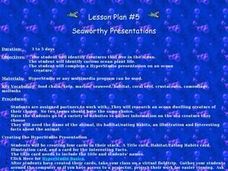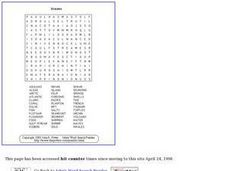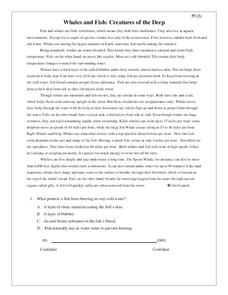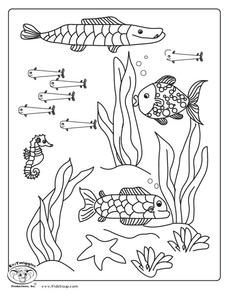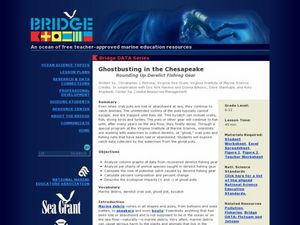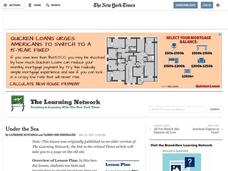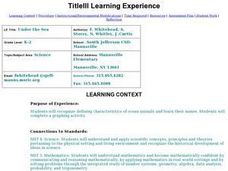Scholastic
Study Jams! Aquatic Ecosystems
Mia's friends are fish-sitting while she is away on vacation. Zoe divulges to Sam that different animals need different habitats, and that there are both freshwater and saltwater ecosystems. Examples of the kinds of organisms found in...
Curated OER
A Monument for Marine Conservation
Students explore the Northwestern Hawaiian Islands to discover what's there and pick up clues as to how people have both harmed and helped the native habitats. They study another protected area and see how to balance conservation efforts...
Curated OER
Seaworthy Presentations
First graders research ocean animals and plants on the web. In this ocean habitat lesson plan, 1st graders prepare a multimedia presentation. Students will work on their presentations in pairs and every group should have its own...
Curated OER
Animals of the Fire Ice
Students examine ocean life by identifying methane hydrates. In this ocean life lesson, students research organisms that live in the coldest, deepest parts of the ocean and live off methane hydrates. Students create a group...
Curated OER
Fishing for Solutions
Students investigate the many ecological and economic issues related to over fishing the world's marine resources. Working in committees, students research the related topics of equipment and fishing techniques.
Curated OER
Ocean Life Word Search
In this language arts worksheet, learners will be searching for words that pertain to the ocean. Students will locate the names of 39 vocabulary words directly related to the topic.
American Museum of Natural History
Dive Into Worlds Within the Sea
The ocean is a series of ecosystems within an ecosystem. Learners dive into an exploration of ecosystems in an interactive lesson. They identify connections between organisms by following leading prompts within the lesson. The resource...
Teach Engineering
The Great Pacific Garbage Patch
The Great Pacific Garbage Patch is one of several garbage patches around the world where garbage accumulates naturally. As part of a GIS unit that combines oceanography, environmental science, and life science, class members investigate...
Curated OER
Whales and Fish: Creatures of the Deep
Practice comparing and contrasting details in informational text with a reading passage about whales. It explains the ways that fish and whales are similar, as well as the ways they are different, and specific characteristics of various...
National Wildlife Federation
Penguin Fun Facts
What's black and white and can dive up to 1,800 feet under water? That's right, penguins! Learn this and many other amazing facts about these unique birds with this handy reference sheet.
Curated OER
Ocean Animals- Same Worksheet
In this picture matching worksheet, students look at the picture of the first ocean animal in each row. Students circle the picture that is the same from two choices. There are 3 questions on the page.
Curated OER
Ocean World
In this online interactive science worksheet, students respond to 7 multiple choice questions regarding icebergs. Students may submit their answers to evaluated.
Curated OER
Do Fish Clean the Ocean?
Learners analyze a reading selection. In this ocean lesson plan, students read a story about the ocean, ocean animals and coral reefs. Learners have the option to complete internet research on coral reefs. Students write in their...
Curated OER
Marine Debris Module
Students analyze issues related to the Hawaiian Islands. They examine previous studies by real scientists and create their own study. They use the results of their study to take action in their local community.
Curated OER
Ocean Life
In this coloring activity worksheet, students color the image of the underwater animals and plants. Students enhance their fine motor skills with the activity.
Curated OER
Ghostbusting in the Chesapeake
Ghost pots, fishing gear lost during crabbing expeditions, continue to trap crabs that are never collected. Increase your budding ecologists' awareness of human impact on the environment as well as conservation efforts using this...
Curated OER
Under the Sea
Learners imagine and describe fictitious sea animals that might live in the ocean. After reading an article, they reflect on new discoveries found in the ocean recently. Using the internet, they research the interdependence of animals...
Curated OER
Ocean Creature Classification
Pupils develop a Taxonomic Key for marine invertebrates from pictures they are given after practicing together with common objects, such as shoes. They then compare their key to a provided Ocean Invertebrates Taxonomic Key.
Curated OER
Protecting Philippine Reefs
Students watch a slide show about the Philippine Reefs to explore the topic of fish populations. In this reef and fish population lesson, students watch a slide show about fish populations and how the Peace Corps works with Filipinos to...
Curated OER
Who Am I?
In this science worksheet, students examine 16 detailed pictures of different species of marine invertebrates. Students identify each species. There is no room to write the name under the picture. It is assumed this is an oral activity,...
Curated OER
Ocean Expedition with Jacques Cousteau
Students role play that they are on an ocean voyage with Jacques Cousteau as they study plant, and animal species and adaptation. They write a five page journal, create artwork of the expedition.
Curated OER
Under the Sea - Ocean Mammals/Fish
Students explore the similarities and differences between ocean mammals and fish. The characteristics of the life forms observed are placed onto a graph. The classroom becomes the botom of the sea and is explored to gain the required data.
Curated OER
One World Ocean
Students compare and contrast the properties of salt water in the oceans/seas and freshwater elsewhere on the planet. They also analyze mixing caused by currents in the ocean, including the effects of warm and cold water as well as with...
Curated OER
Properties of the Ocean: Change
Students research and create a visual presentation on the seasonal salinity of the Earth's oceans. They apply the research in a simulation of a lab disaster in which they must relabel ocean samples.




